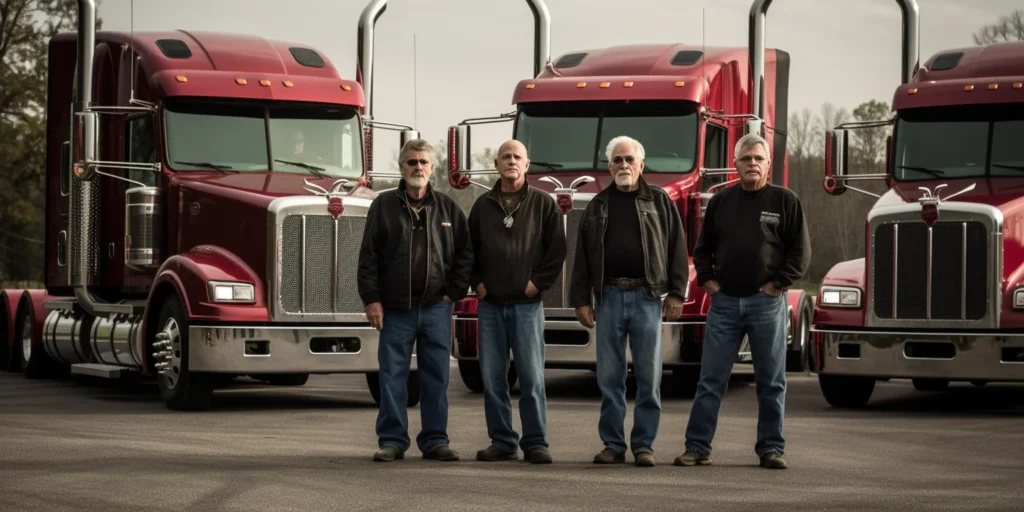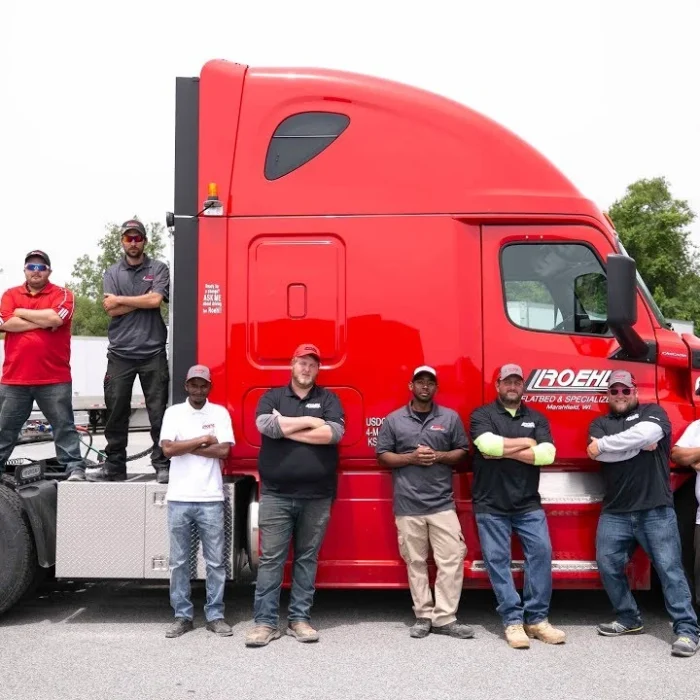Commercial Truck Financing
Commercial truck financing, including semi truck financing, plays a vital role in the growth and expansion of trucking businesses. It involves securing loans or leases to purchase or lease semi trucks and commercial vehicles, which can be a significant investment.
This comprehensive guide will explore the benefits of truck financing, various semi truck financing options, factors to consider before applying, and tips for a successful application.

Benefits of Commercial Truck Financing
Improved Cash Flow
One of the main advantages of commercial truck financing is the positive impact on cash flow. By financing your commercial truck or semi truck, you can avoid the large upfront costs associated with purchasing a vehicle outright, allowing you to invest that money into other areas of your trucking business.
Access to Newer Equipment
Commercial truck financing, including commercial fleet financing, can provide access to newer, more efficient equipment that can improve your trucking business’s performance. By financing your commercial truck or semi truck, you can potentially access newer models with better fuel efficiency, advanced safety features, and lower maintenance costs.

Types of Commercial Truck Financing Options
Commercial Truck Loans and Semi Truck Loans
Commercial truck loans and semi truck loans are popular options for financing a commercial vehicle. With a commercial vehicle loan, a lender provides you with the funds to purchase the truck, and you repay the loan over a set period. The commercial truck or semi truck serves as collateral, and you’ll own the vehicle once the loan is fully repaid.
Commercial Truck Leasing and Semi Truck Financing
Commercial truck leasing, including semi truck financing, is another option for acquiring a commercial vehicle. This involves entering into an agreement with a leasing company to lease the truck for a specified period. At the end of the lease term, you have the option to return the vehicle, purchase it at a predetermined residual value, or renew the lease.
Traditional Banks and Credit Unions
Traditional banks and credit unions are popular choices for commercial truck financing and semi truck financing. They typically offer competitive rates and longer repayment terms for qualified borrowers. However, they may have more stringent credit score requirements and may not be as flexible with financing options as alternative lenders.
Alternative Lenders
Alternative lenders, such as online lenders and direct lenders, offer commercial truck financing and semi truck financing options that cater to a broader range of credit scores and business profiles. They may be more accommodating to borrowers with less-than-perfect credit or unique financing needs. Some examples of alternative lenders include First Capital Business Finance and CAG Truck Capital.
Equipment Financing
Equipment financing is another option for commercial truck financing and semi truck financing. This type of financing is specifically designed for the purchase or lease of business equipment, including commercial trucks and semi trucks. Equipment financing can be obtained through banks, credit unions, and other lenders that specialize in this type of financing.
Small Business Loans
The Small Business Administration (SBA) offers various small business loans, which can be used for commercial truck financing and semi truck financing. These loans may offer more favorable terms and lower interest rates than traditional loans, but they often come with strict eligibility requirements and a more extensive application process.
Peer-to-Peer Lending
Peer-to-peer lending is an alternative method for obtaining commercial truck financing and semi truck financing. It involves borrowing money from individual investors rather than a traditional bank or lending institution. Peer-to-peer lending platforms typically have a faster and more straightforward application process, but interest rates may be higher than those of traditional lenders.
Below is an expanded list of the top 10 highest paying trucking companies with approximate yearly salaries and information on work hours. Keep in mind that work hours may vary depending on factors such as route, freight type, and company policies.
Walmart Transportation
- Average yearly salary: $75,000 to $90,000
- Work hours: Walmart drivers typically work full-time, with regional and local routes that allow for regular home time. The company aims to provide predictable schedules and consistent hours.
Sysco
- Average yearly salary: $65,000 to $85,000
- Work hours: Sysco drivers generally work full-time and have local or regional routes, which means they can expect regular home time. Some positions may require early morning starts or occasional weekend work.
Old Dominion Freight Line
- Average yearly salary: $60,000 to $80,000
- Work hours: Old Dominion drivers usually work full-time, with various shifts available, including day and night. Many positions offer regular home time, although some regional or long-haul routes may require longer periods away from home.
UPS
- Average yearly salary: $60,000 to $75,000
- Work hours: UPS drivers typically work full-time, with shifts that can vary based on route and package volume. While many drivers enjoy regular home time, peak seasons may require additional hours or weekend work.
FedEx
- Average yearly salary: $55,000 to $75,000
- Work hours: FedEx drivers generally work full-time, with varying shifts and routes. Many positions offer regular home time, but long-haul or regional routes may require extended periods away from home.
YRC Worldwide
- Average yearly salary: $55,000 to $70,000
- Work hours: YRC Worldwide drivers often work full-time, with different shifts and routes available. Local and regional positions typically offer regular home time, while long-haul drivers may spend more extended periods on the road.
J.B. Hunt Transport Services
- Average yearly salary: $50,000 to $80,000
- Work hours: J.B. Hunt offers a variety of driving positions, with work hours that can vary based on route and job type. Many positions provide regular home time, but some regional or long-haul roles may require longer periods away from home.
XPO Logistics
- Average yearly salary: $55,000 to $75,000
- Work hours: XPO Logistics drivers typically work full-time, with a range of shifts and routes available. Local and regional positions often allow for regular home time, while long-haul drivers may spend more time on the road.
Schneider National
- Average yearly salary: $50,000 to $75,000
- Work hours: Schneider National drivers usually work full-time, with various shifts and routes to choose from. The company offers positions with regular home time, as well as regional and long-haul opportunities that may involve longer periods away from home.
Con-way Freight
- Average yearly salary: $50,000 to $70,000 (before acquisition by XPO Logistics)
- Work hours: Before the acquisition by XPO Logistics, Con-way Freight drivers generally worked full-time, with a variety of shifts and routes available. Many positions offered regular home time, although some regional or long-haul roles required extended periods on the road.

Factors to Consider Before Applying for Commercial Truck Financing
Credit Score
Your personal credit score plays a crucial role in determining your eligibility for commercial truck financing, including semi truck financing. Lenders will look at your credit history to assess your creditworthiness and the likelihood that you’ll repay the loan or lease.
Down Payment
Most commercial truck financing and semi truck financing options will require a down payment, typically ranging from 10% to 25% of the truck’s purchase price. Having a larger down payment can improve your chances of securing favorable financing terms and lower interest rates.
Truck Usage
Before applying for commercial truck financing, consider how the commercial truck or semi truck will be used in your trucking business. Lenders may have specific requirements based on the intended use, such as long-haul versus local transportation, or carrying hazardous materials.
Understanding your truck’s purpose will help you choose the right financing option to meet your needs.

Commercial Truck Financing Tips for Different Credit Levels
Good Credit
For borrowers with good credit, securing commercial truck financing and semi truck financing is generally easier. Traditional banks and credit unions may offer more favorable interest rates and loan terms. Be sure to shop around and compare offers from different lenders to find the best deal.
Bad Credit
For borrowers with bad credit, obtaining commercial truck financing and semi truck financing may be more challenging. However, alternative lenders, such as First Capital Business Finance and CAG Truck Capital, may offer financing options for those with less-than-perfect credit scores.
Be prepared for potentially higher interest rates and larger down payment requirements.

Understanding Interest Rates for Commercial Truck Financing
Interest rates for commercial truck financing and semi truck financing can vary widely based on factors such as credit score, down payment amount, and the type of financing option selected. It’s essential to understand how interest rates work to make informed decisions when choosing a financing option.
Fixed Interest Rates
Fixed interest rates are a popular option for commercial truck financing and semi truck financing. This means that the interest rate is set at a fixed percentage for the life of the loan or lease, providing predictable monthly payments and easier budgeting.
Competitive Rates
Many lenders offer competitive rates for commercial truck financing and semi truck financing. These rates may be lower than traditional banks and credit unions, making alternative lenders an attractive option for borrowers looking to save money on interest charges.
Interest Rates and Credit Scores
Your credit score plays a significant role in determining the interest rate for commercial truck financing and semi truck financing. Borrowers with good credit scores typically qualify for lower interest rates, while those with bad credit scores may face higher rates.

Tips for Lowering Monthly Payments for Commercial Truck Financing
Down Payments
A larger down payment can lower monthly payments for commercial truck financing and semi truck financing. Lenders typically require a down payment of 10% to 25% of the truck’s purchase price, but a larger down payment may lead to better financing terms.
Refinancing
Refinancing your commercial truck loan or lease can potentially lower your monthly payments by securing a lower interest rate or extending the repayment term.
Own Funds
Using your own funds to purchase a commercial truck outright can eliminate monthly loan or lease payments altogether. This option may not be feasible for all borrowers, but it’s worth considering if you have the cash on hand.

Additional Considerations for Commercial Truck Financing
Employment History
Lenders may consider your employment history when evaluating your commercial truck financing application. A stable employment history demonstrates reliability and financial stability, which can improve your chances of securing financing.
Personal Guarantee
Some lenders may require a personal guarantee for commercial truck financing and semi truck financing, especially for borrowers with less-than-ideal credit. This means you’ll be personally responsible for repaying the loan if your business fails to make payments.
Hidden Fees and Charges
When comparing commercial truck financing options, be aware of any hidden fees or charges. Some lenders may charge application fees, prepayment penalties, or other additional costs. Make sure to read the fine print and understand all the terms and conditions before committing to a financing option.

Tips for a Successful Commercial Truck Financing Application
Maintain a strong credit history: A good credit score is vital to secure the best commercial truck financing and semi truck financing terms. Pay your bills on time, keep credit card balances low, and regularly monitor your credit report for inaccuracies.
Prepare a detailed business plan: A well-prepared business plan can demonstrate your understanding of the commercial trucking industry and your commitment to the success of your trucking business, making you a more attractive borrower.
Research lenders and financing options: Compare different lenders and commercial truck financing options to find the best fit for your needs. Look for reputable lenders with experience in the trucking industry.
Gather necessary documentation: Before applying, ensure you have all required documentation, such as proof of income, tax returns, and business financial statements.
Negotiate terms: Don’t be afraid to negotiate the terms of your commercial truck financing or semi truck financing agreement. This may include interest rates, down payment requirements, and loan or lease terms.

Frequently Asked Questions
Can I finance a used commercial truck or semi truck?
Yes, you can finance both new and used commercial trucks and semi trucks. However, lenders may have specific age and mileage requirements for used trucks.
How long are typical loan or lease terms for commercial truck financing and semi truck financing?
Loan and lease terms for commercial trucks and semi trucks typically range from 3 to 7 years, depending on factors such as the age and condition of the truck and the borrower’s creditworthiness.
Can I finance a commercial truck or semi truck with bad credit?
While it may be more challenging to secure commercial truck financing with bad credit, some lenders specialize in working with borrowers with less-than-perfect credit. Be prepared for potentially higher interest rates and larger down payment requirements.
Are there any grants or special programs available for commercial truck financing and semi truck financing?
There may be federal, state, or local programs available to assist with commercial truck financing, particularly for businesses owned by women, veterans, or minorities. Research and reach out to relevant agencies for more information.
Can I refinance my existing commercial truck loan or lease?
Yes, refinancing your existing commercial truck loan or lease may help lower your monthly payments or reduce your interest rate. Consult with your current lender or explore other options to determine if refinancing is the right choice for your situation.

Final Words
Commercial truck financing, including semi truck financing, is a critical tool for businesses and individuals in the trucking industry. By understanding the benefits, types of financing options, and factors to consider before applying, you can make informed decisions to secure the best financing solution for your needs.
With the right financing in place, you can grow your business and take advantage of new opportunities in the commercial trucking industry.







